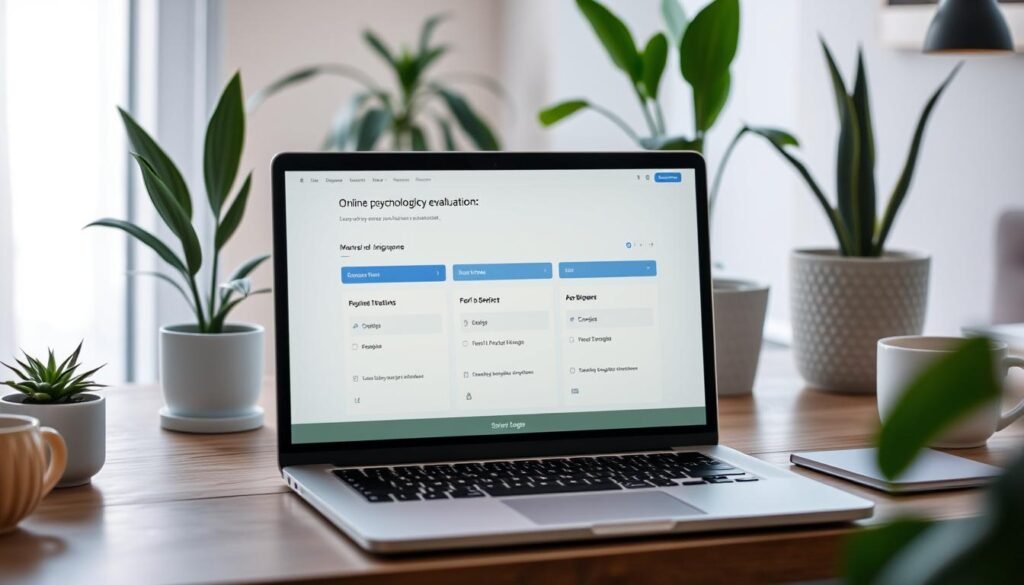Nearly 1 in 5 adults in the U.S. faces mental illness every year. This shows the great need for mental health resources. Resources like depression and anxiety tests can offer deep insights into someone’s feelings and help tackle mood disorders.
Getting an emotional wellbeing test can be a big help. It lets you see how you feel and shows where you might get better. Tests like the mood disorder questionnaire increase self-awareness and urge taking action. Taking an anonymous test gives insights without having to share personal info.
Want to know more about your mental health? Try an online tool to reflect on your emotions over time. Mental Health America has some options to get started.
Key Takeaways
- One in five adults in the U.S. faces mental health challenges yearly.
- Depression and anxiety tests encourage self-reflection and awareness.
- An anonymous assessment can lead to a better understanding of one’s mood.
- Mood disorder questionnaires help identify areas for improvement.
- Utilizing online screening tools can enhance accessibility to mental health resources.
- Exploring resources like Mood Care Health can provide additional support.
Understanding Mental Health Assessments
Mental health assessments are key in measuring emotional, psychological, and social wellbeing. They help people understand their mental health better. Through questionnaires and interviews, these assessments give a full view of someone’s mental state.
The Patient Health Questionnaire Anxiety-Depression Scale (PHQ-ADS) is a common tool used. It’s highly reliable, with a consistency score between 0.8 and 0.9. Scores range from 0 to 48, with higher scores indicating more severe depression and anxiety.
This tool uses specific score levels to classify mental distress as mild, moderate, or severe. Its strong accuracy is shown through high validity scores. This validates the PHQ-ADS as an effective mental health measure.
These assessments do more than just spot symptoms. They offer crucial info for early help. Early detection of mood disorders allows for timely support. Knowing the importance of these assessments enables people to manage their emotional health.
The Importance of Mood Evaluation
Checking your mood is key to understanding your emotions. Regular checks can show changes in mood that affect your daily life and health. By looking closely at your stress level, you can find patterns that might show bigger problems.
There are many tools to help with mood checks. For example, the Beck Depression Inventory has 21 questions. It checks how severe depressive symptoms are. The Patient Health Questionnaire-9, or PHQ-9, looks at severity of symptoms using DSM-5 criteria. This makes it very useful in clinical settings.
| Assessment Tool | Purpose | Number of Questions |
|---|---|---|
| Beck Depression Inventory | Measures intensity of depressive symptoms | 21 |
| Patient Health Questionnaire-9 | Assesses severity based on DSM-5 | 9 |
| Center for Epidemiologic Studies Depression Scale | Measures frequency of symptoms | 20 |
| Montgomery-Asberg Depression Rating Scale | Severity assessment focusing on core symptoms | 10 |
These tools are great for checking your emotional health. They help catch mental health problems early. This allows for quick action to be taken. Knowing about mood changes and doing regular checks can help you better understand your mental state. Being aware is key in managing conditions like depression. This requires focusing on the patient and working together for care.
What is a Depression and Anxiety Test?
A depression and anxiety test is a tool for checking your mental health. It’s like a quiz that helps you understand if you’re feeling depressed or anxious. Doctors and therapists use these tests to get an idea of how you’re feeling.
These tests are found online and use special questionnaires to measure your feelings. For instance, they might use the Patient Health Questionnaire (PHQ-9) or the Generalized Anxiety Disorder scale (GAD-7). They look at how you’ve felt in the past two weeks. This helps you know your mental health better.
The PHQ-9 has nine questions. They ask about different signs of depression. You’ll answer based on how often you’ve felt a certain way recently. Your answers help figure out if your depression is light, moderate, or severe.
The GAD-7 also has questions but focuses on anxiety. Its answers help see if you might have mild, moderate, or severe anxiety.
What you learn from these quizzes is important. It can show if you need to talk to a doctor for more help. Think of it as the first step to understanding and improving your mental health.
| Test | Purpose | Number of Items |
|---|---|---|
| PHQ-9 | Assess severity of depression | 9 |
| GAD-7 | Evaluate levels of anxiety | 7 |
| Beck Depression Inventory | Measure intensity of depression symptoms | 21 |
| Hamilton Rating Scale for Depression | Evaluate effectiveness of treatments | 17 |
| Zung Self-Rating Depression Scale | Self-assess depression severity | 20 |
How Online Screening Tools Work
Online tools make it easy for people to check their mental health. They answer questions about how they feel, which takes 5 to 15 minutes. These tools are based on science to spot mental health issues well. They tell people right away how serious their symptoms are with scores.
With these tools, you can look at your past results on charts. This shows how your mood changes over time. Knowing this helps you keep an eye on your well-being. Depending on their risk, people are advised on how often to retest. This can catch problems early on.
But remember, these online tests can’t replace a real doctor’s opinion. Tools like the Beck Depression Inventory are still very important. The test results can tell you if you need to see a doctor or learn more about your mental health.
Some might worry about how accurate these tests are because they rely on what users say about themselves. But, AI tools like the SmartCare checker make results more trustworthy. They give quick, evidence-based feedback. This technology helps people better know and manage their mental health while keeping their information private.

| Frequency of Testing | Target Group | Recommended Actions |
|---|---|---|
| Every week or two | High-risk individuals | Seek immediate support if symptoms worsen |
| Every 4 to 6 weeks | Low-risk individuals | Monitor symptoms and readiness for follow-up |
Interpreting Your Test Results
Mental health test results are key to understanding your mental state. High scores point to more symptoms of anxiety and depression. This shows a need to talk more with a health expert. Knowing what these scores mean helps in choosing the right treatment and care.
What Elevated Scores Indicate
The DASS-10 and similar tests measure your mental health. Higher scores mean more distress, placing you in severity categories like:
| Severity Level | Score Range |
|---|---|
| Subclinical | 0-4 |
| Mild | 5-9 |
| Moderate | 10-15 |
| Severe | 16-20 |
| Extremely Severe | 21+ |
These scores help when talking with mental health pros. They offer deep insights that web tests can’t.
Understanding Symptoms Associated with Scores
The SIGECAPS mnemonic is a helpful guide. It helps identify symptoms of anxiety and depression. SIGECAPS includes:
- Sleep changes
- Intrest loss
- Guilt or feelings of worthlessness
- Energy loss
- Concentration issues
- Appetite changes
- Psychomotor agitation or retardation
- Suicidal thoughts
Knowing these symptoms helps in seeking the right help. This could be therapy, lifestyle adjustments, or joining support groups. Learning about mental health boosts self-awareness. It also encourages growth towards wellness.
Using Psychological Evaluations for Better Health
Psychological evaluations are key in grasping an individual’s mental state. They offer a full look at mental health issues. These assessments help spot problems that might lead to depression or anxiety. Knowing this is crucial for making mental health strategies that fit each person.
Healthcare providers use tests and observations to find emotional health symptoms. Tools like the Patient Health Questionnaire (PHQ-2) and PHQ-9 are great at finding depression. With this info, they can make treatment plans that tackle the real issues, not just the symptoms.

Good evaluations help with treatment and improve emotional wellness. They let people see what they’re good and bad at. This knowledge helps them use their strengths to handle life’s problems. This approach builds strength to face tough situations.
For more, look at psychological evaluations and mental health advice. Getting assessed can help manage mental health better, leading to a happier life.
| Evaluation Tool | Description | Purpose |
|---|---|---|
| PHQ-2 | A brief screening tool with 2 questions. | Identifies potential depression symptoms. |
| PHQ-9 | A 9-item questionnaire assessing depression severity. | Monitors severity of depression and treatment progress. |
| CES-D | 20-item questionnaire for measuring depressive symptoms. | Evaluates symptom severity in diverse populations. |
| BDI | 21 questions assessing depressive symptoms. | Determines severity and changes over time. |
Benefits of Self-Assessment Quizzes
Taking a self-assessment quiz can reveal a lot about your mental health. By responding to questions on how you’re feeling, you start to understand any mental health issues you might have. Knowing these issues is the first step towards improving your emotional wellbeing.
Identifying Potential Mental Health Issues
Self-assessment quizzes help spot the early signs of mental health troubles. They ask specific questions, making it easier to find symptoms of depression or anxiety. Using tools like the Patient Health Questionnaire (PHQ-9) can show if your symptoms are mild, moderate, or severe. Remember, these quizzes can’t replace the need for a professional evaluation.
Tracking Your Emotional Wellbeing Over Time
Another benefit of these quizzes is tracking your emotional health. By taking them regularly, you can see changes in your mood and stress. This helps you and your healthcare provider understand your mental health trends. Over time, this self-awareness aids in managing long-term mental health.
| Self-Assessment Quiz Benefits | Description |
|---|---|
| Early Identification | Assists in recognizing potential mental health issues before they escalate. |
| Personal Awareness | Encourages individuals to reflect on their emotional wellbeing. |
| Support for Professionals | Provides a foundation for discussing results with healthcare providers. |
| Tracking Progress | Enables individuals to monitor their emotional status over time. |
| Proactive Steps | Empowers users to take informed actions regarding their mental health. |
Resources for Further Support
Finding more help after taking a depression and anxiety test is key. There are many support options for people dealing with anxiety and depression. This includes hotlines, online help, and local services ready to assist right away.
The Anxiety and Depression Association of America (ADAA) is a great place to find specialized support. They have a Find Your Therapist Directory. This helps people find mental health experts good at treating anxieties, depression, and OCD. It helps users find the right therapist for their specific needs.
ADAA also has free webinars by experts about various mental health topics. One highlight is a Free Live Webinar on Managing Stress and Anxiety coming on December 3rd. These online sessions offer coping strategies. Plus, they provide info on Generalized Anxiety Disorder, Obsessive-Compulsive Disorder, and more.

If you’re feeling unsure or worried after your test, reading some blogs can help. Topics like Post Election Anxiety are covered. These pieces offer useful tips for handling stress and anxiety well.
Here are some important resources to look at:
- ADAA’s webinars: Free sessions about anxiety disorders.
- Materials on Depression: Helps in understanding and managing depression.
- Guides on Choosing a Therapist: Tips for finding a mental health pro.
- Clinical Trials Participation: Chances to join studies on mental health.
Using these mental health resources can really help on your journey. Remember, you’re not alone in this fight. There’s plenty of support for dealing with anxiety and depression online and in your community.
| Resource | Description | Link |
|---|---|---|
| Find Your Therapist Directory | Connects individuals to licensed mental health professionals. | Visit ADAA |
| Webinars | Live and on-demand webinars with expert advice. | Explore ADAA’s offerings |
| Blog Posts | Informative articles on managing specific types of anxiety. | Read the latest insights |
| Understanding Materials | Educational resources for various mental health disorders. | Access helpful guides |
When to Seek Professional Help
Knowing when to get help for mental health is key for those feeling anxious or depressed. Spotting signs early can really help improve life. Some clear signals to get help include:
- Prolonged feelings of sadness or hopelessness.
- Big changes in how you eat or sleep.
- Not enjoying things you used to love.
- Hard time focusing or making choices.
- Thinking about hurting yourself or others.
Tools like the PHQ-9 can show how severe symptoms are. They ask about problems over the last two weeks. A score between 15-27 suggests serious depression and the need for a quick check by a doctor. It’s important to act fast to get help with anxiety and depression.
Major depression can really mess with everyday life. Struggling to work, sleep, study, or eat are key signs. If these continue for over two weeks, it’s critical not to ignore them. There are also specific types like seasonal affective disorder and postpartum depression that need attention. Regular checks from age 12, during pregnancy, and after having a baby are a good idea.
If you think about self-harm, it’s time to reach out for professional help. The National Suicide Prevention Lifeline is a great resource, call them at 1-800-273-TALK (1-800-273-8255). Getting help early can really boost recovery. Knowing when to seek help is a big step towards mental health.
Conclusion
Depression and anxiety tests are key in boosting mental health awareness. They let people see their emotional wellness. This helps them understand their mental state better.
With depression’s prevalence up to 4%, and a 20% lifetime risk, these tests are crucial. They help identify those needing extra support.
Studies show higher depression and anxiety in certain groups. This makes early detection key. For example, women are 2 to 3 times more likely to face depression than men. Also, many seek help from primary doctors, not mental health pros.
This knowledge leads to early action, highlighting the need for good mood tests. It shows the importance of understanding our mental health well.
Creating a supportive environment is essential. It should encourage seeking help and staying aware of mental health. This approach can lead to healthier communities.
As awareness grows, mood assessments play a big role. They help those struggling, fostering recovery and resilience among all.